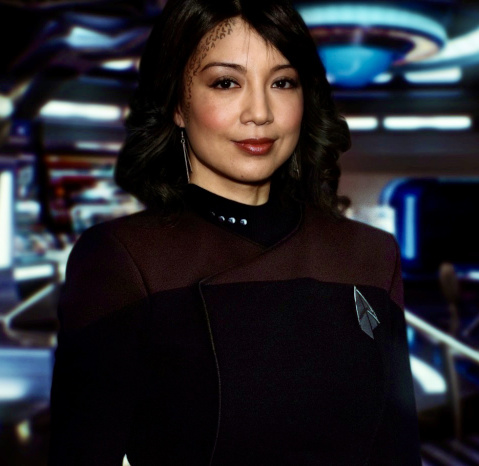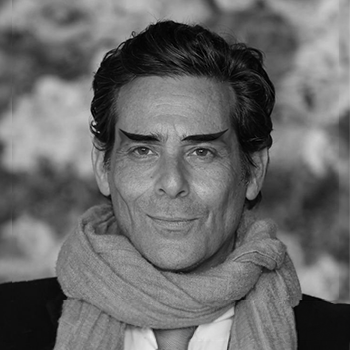Ayres, who had been awake for quite a while without admitting it to himself, kept his eyes closed and let the soundscape flow around him: the deeper undertone of the environmental systems and the soft, even rhythm of Parr’s breathing against his shoulder. He had long since learned not to mistake this hour for anything but what it was: a reprieve. The mind tries, at such times, to convince you that the day will behave itself because the first few minutes have. He was old enough to be amused by the trick and young enough to want to be fooled by it.
“Don’t pretend,” she murmured, voice muffled. “You’re awake.”
He made a show of indolence. “Am I?”
“You are.” She shifted, the sheet slipping, a stretch like a cat coaxing blood into its limbs. “Your breathing changes, like you’re about to give a speech.”
“Would you like me to snore instead? I can snore on demand.”
“Please don’t,” she said. “It would ruin the ambience.”
Ayres opened one eye. Emilia Parr lay half turned towards him, hair a dark spill across her shoulders, the light painting the high line of her cheekbone. Her expression, at rest, had a tendency to seriousness. But he knew that laughter sat nearby, ready to rise. It was part of what had undone him.
“You’re meant to be the sensible one,” he said.
“I am the sensible one,” she replied gravely. “I’m simply off duty until I have coffee.”
“That’s not how sensibleness works.”
“Oh, captain,” she said, and the title was faintly teasing, “is there a manual for it?”
“Several. They’re dull. No pictures.”
“No wonder,” she murmured, and slid her hand over his chest, not coyly but with the frankness of someone who had decided a certain battle was not worth fighting and would rather enjoy the landscape. Then she propped herself on an elbow, studying him with a faint, genuinely curious smile.
He grinned despite himself.
She narrowed her eyes in mock thought.
“You know,” he said, “we are making all of this very difficult for ourselves.”
“I know,” she said softly. “Doesn’t it make it all feel spectacular?”
“Emilia.”
“I know,” she said again, not contrite but truthful. She put her forehead to his, and he felt the warm press of her breath. “We’ll be careful.”
“Careful’s relative,” he murmured.
“We are very, very dull when we try to be models of restraint,” she countered.
“Speak for yourself.”
“I am.” She smiled. “And for you. You think a lack of restraint is a character flaw.”
“It is. In a captain.”
“You’re impossible.”
“Frequently.” He turned his head and kissed her nose, which made her blink with a small, involuntary softness that delighted him.
For a while they lay there in silence. The day sat outside the door of his quarters, waiting. Ayres allowed himself, briefly, that old human trick of believing in continuities. There would be a shift, a departure, an uncomplicated patrol along trade routes. He would walk the ship, exchange a dozen ordinary words with a dozen ordinary people, write one or two lines of warm nonsense in his log to remind some future version of himself that not every day required struggle or heroics. He did not believe it, not entirely. But it was a good story to start the day with.
“Right,” Emilia said at last, in a decisive tone. “Replicator. Coffee. We become respectable again, and I promise to wear the face that says I slept beautifully because I am a paragon.”
He affected shock. “You have such a face?”
“Of course,” she said, rolling away and reaching for the sheet with a movement that made it very clear she knew perfectly well what she was doing. “I use it to terrify ensigns.”
“That must be terribly effective.”
“It is.” She stood, the sheet a careless toga, and crossed to the replicator. “Two coffees, strong, no sweetener, and…”
“And the croissant you will deny having eaten?”
“Do not,” she said without turning, “reveal my secrets.”
He watched her, feeling his chest do that inconvenient something it had not done with such regularity since he was twenty-five and disastrously romantic. It was not simply desire. It was the quick, electric gladness of two people discovering love together.
She returned with the coffees and croissant. They ate companionably, sipping coffee. Conversation meandered; a brief tally of the day’s rota, an exchange about a supply request from medical, and a general excitement to be on the cusp of exploring the Shackleton Expanse. They laughed twice for no reason at all, and once for the very good reason that laughter puts off goodbye for another thirty seconds.
“Shift in twenty,” he said eventually, checking the chronometer.
He stood and found his undershirt, shrugging into it with a neatness that suggested long habit rather than vanity. The uniform jacket followed. The weight of it did something particular to his posture, pulling him very slightly upright. Emilia watched, still wrapped in the sheet, eyes amused and fond.
“If I were a poet,” she said, “I’d write about the way a man puts on a uniform and becomes someone else.”
“Please don’t,” he said.
He fastened the last of the clasps and, on instinct, reached to tidy a strand of hair that had fallen against her cheek. His knuckles brushed her skin, a small, charged contact. She did not move, only looked up and held his gaze.
“Go,” she said gently. “Before we scandalise ourselves into missing our departure from the station.”
“Meet me on the bridge?”
“I’ll take her out,” Emilia said, at once executive and conspirator. “You go and perform your obligations to Aloran. He’ll pout if you don’t.”
“Can Vulcans pout?”
She dropped the sheet, naked, and moved towards the shower with the briskness of someone who had never once been late for anything important. Over her shoulder, lightly: “And Mike, try very hard not to look pleased with yourself when you reach the turbolift. You’re atrocious at curating your face.”
“I am a master of inscrutability,” he protested.
“Mm,” she said, vanishing into the bathroom.
Fusion Centre
Aloran was standing very still at a console, the stillness of someone who has already done six things quickly and is now allowing his mind to catch up and appraise them. Ayres had grown to like the Vulcan and, loathe he was to admit it, found the man’s age and experiencing comforting.
“Commander,” Ayres said.
“Captain. I have assembled all that we know about the mission parameters from the Framheim’s admittedly sparse intelligence collection.”
“A journey into the unknown, eh?”
Aloran’s profile altered half an inch; on another face, the movement would have been a sigh. “The Shackleton Expanse is an unusual opportunity. I would even say that it represents going back in time, metaphorically.”
“I wouldn’t have thought literally, Aloran. But I get it. The newness, the lack of preexisting treaties, old grudges with Klingon houses, that sort of thing.”
“Precisely. I would not have thought that I, personally, would have the opportunity to feel young again. To be able to strike out and form new relationships with as-yet-unmet species and societies.”
“You’re sounding sentimental.”
“Anticipation, captain. But we should consider the briefing.” Aloran motioned to the screen in front of them. “We have a priority mission, as you know, to explore what we know are existing trade routes and to render whatever aid – practical or informational – that is necessary.”
“I cannot imagine how strange this must be for the people here. The rules upended.”
“Quite. And we all expect to encounter a degree of inequality in how, practically and intellectually, the societies in the expanse respond to their change in circumstances.” Aloran tapped at the console. “Starfleet’s limited intelligence suggests that something unexpected is occurring along these extensive trade corridors. Even accounting for the difficulties in adjustment and the variation in ship’s speeds, there are reports of trade ships failing to arrive where they intended to. A few freighters are missing.” He tapped again. “A convoy that cut short its route and turned up three sectors away. A pair of civilian prospectors who reported whispering in their communications before shutting down their transponders and disappearing entirely.”
Ayres’ mouth quirked. “Sounds like a ghost story.”
“Starfleet intelligence’s commentary was drier,” Aloran said. “They appended a single word in their assessment: pirates? With the question mark accurately representing the confidence of our knowledge on the matter.”
“Do we have anything besides rumours and a question mark?”
“Only the evidence of absence,” Aloran said. “No distress calls. No recovered cargo. No transmissions from emergency buoys.”
“Well. That is an exciting mystery.”
“As I said, captain, the anticipation is something to relish.” Aloran said, with a disarming smile.
Main Bridge
Parr still had not discovered the easy way to sit in the command chair. It felt overly large. As a consequence she spent most of her time loitering at other consoles. But on this shift she was adamant to remain seated.
“Ops, status on the resupply crates?”
“All accounted for and stowed,” said the young ensign, a competent man who had arrived three weeks prior.
“Good. Tactical?”
“Shields calibrated, phaser alignment checked and synced. A full complement of torpedoes replenished, and flight control has assured me that our squadron has taken full advantage of the maintenance window,” reported Kincaid, as calm and measured as always.
“Helm,” Parr said, turning slightly in her chair, “bring us about and hold her on this heading,” she tapped at her chair’s console, “thrusters followed by impulse when clear of the station and the traffic. Let’s not swing out and clip anyone important.”
“Understood,” the officer replied, fingers light on the controls. “Moving us away from Framheim Station.”
The Farragut took her leave of Framheim Station.
“Clear of the station perimeter,” the officer at helm reported. “Impulse power steady.”
“Very well,” Parr said, and even her ‘very well’ seemed committed to optimism. “Set course for our patrol sector, as filed. Engage at warp six.”
“Aye, commander.”
The stars elongated, threads pulled from a black fabric, and then they broke into the clean shock of warp. The deck vibrated a small, reassuring amount.
Parr leaned back and allowed herself to feel it: the thrum, the slight lift, the happy alignment of very complicated systems all performing as expected. It was, and always had been, the feeling to which she was most dangerously addicted. She understood how it all worked and yet it all felt like magic. And magic she was presently in command of.
Ayres stepped onto the bridge then, and Parr looked across without looking across, reflexively making room for him without yet vacating the seat.
“Captain on the bridge,” Kincaid said and Parr had to resist the ridiculous impulse to stand and make a joke.
“As you were,” Ayres said. “Commander Parr, thank you for taking us out. A very elegant departure, I’m sure.”
He came to the rail behind the command seat, close enough that she could feel him in the way one feels warmth rather than contact. It was the distance they had decided upon in public. She found it almost more intimate than the business of losing sheets and laughing at breakfast. He leaned forward so as to take in the sight of Parr and Kincaid.
“Commanders, I hope you’re excited for some exploration. With the Vaadwaur and then our Tholian encounter, I think we’ve earned a break.”
“Aye, sir.” Kincaid smiled, not as heartily as he would have before the Vaadwaur. But, Ayres noted, at least he was trying.
He moved to the science console, peering over Jevlak’s shoulder. “Anything odd on our path?”
“Negative,” Jevlak said, a degree of irritation edging the Cardassian’s voice. “Sensor returns are crisp but subspace is awash with noise from all of the activity from our fleet alongside that of the Klingons, Romulans, and others.”
“Commander Aloran would call that noise anticipation.”

 Bravo Fleet
Bravo Fleet










